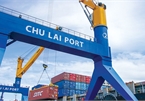 |
| Dr. Tran Du Lich, a member of the Prime Minister’s economic advisory group. — Photo vietstock.vn |
What are the three breakthroughs Vietnam has failed to achieve in implementing the 10-year National Economic Strategy?
The 11th National Party Congress in January, 2011 came up with three major breakthroughs in the fields of institutions, education and infrastructure development in the 10-year strategy.
In the field of institutions, in the 10 years we have done quite a lot of work, including revising the Constitution. However, the more legal work we do the more overlaps between laws. A typical example is overlaps among the Land Law, the Construction Law, the Budget Law, the Planning Law and others. Such overlaps between laws have caused serious problems for many projects. Our ideology for economic institutions is rather open, particularly since the revised Constitution 2013 came into force. Yet in reality, we have faced many challenges in implementing the institution due to overlaps or conflicts between laws.
The second area I want to mention is the implementation of the Law on Education. In the last decade, school textbooks have been subjected to revisions several times, as were the roles of the public and private agencies in textbook reform. Last but not least, the quality of the human resources in this field has not been properly treated.
And third, is the country's infrastructure. It is undeniable the fast construction of infrastructure has become quite a big challenge to many localities nationwide. Yet, the quality of these projects has been so poor and no one will bear the responsibility for such poor road construction work.
Do you have any comments on the development of the private sector?
The private sector has scored many successes, yet it is not yet up to our expectation. The private sector has not steadily developed. We have more than 700,000 private enterprises nationwide, yet they contribute just about 10 per cent of GDP. Though we have exerted efforts to develop the collective economy, including co-operatives, yet development is very slow. Meanwhile, though the foreign-invested sector has achieved remarkable progress, it has failed to help Vietnamese enterprises develop, particularly in the field of technology and the supporting industry.
What has been preventing us from achieving our targets?
In 1991, the private economy started to develop. Yet it was still in the form of 'ask and give'. Then in the year 2000, instead of 'ask and give' the Government issued a policy that any business had to register with all concerned Government agencies. And then in 2015, the law changed and all Vietnamese citizens could do anything they wanted as long as they didn't break the law.
In your opinion, what is the Government's role in regulating the national economy?
The market economy model has quite a lot of advantages, yet it still has three major weaknesses.
First, the market is intangible which may lead to crises with shortages or redundancies.
Second, the interests of enterprises and the nation are sometimes contradictory. Enterprises may make a decision to prioritise themselves over the public in the case of environmental pollution, fake goods or trade fraud.
And third, a driving force of a private economy is to bring benefits to themselves first and then to the general public.
To solve this problem, we need an adjustment from the Government and the Government will then use all available tools and policies to curtail these weaknesses of the market economy. — VNS

Vietnam's private sector positioned for prosperity
Ongoing assistance will see Vietnam's private sector truly become a driver of economic growth, stakeholders said.

Who will lead Vietnam's economy?
Since it normalized relations with the powers like China in 1991 and the USA in 1995, Vietnam has begun to integrate into the global economy.
 Dr. Tran Du Lich, a member of the Prime Minister’s economic advisory group, talks on the main hindrances preventing Vietnam from gaining more economic achievements in the course of implementing the 10-year National Economic Strategy (2011-20).
Dr. Tran Du Lich, a member of the Prime Minister’s economic advisory group, talks on the main hindrances preventing Vietnam from gaining more economic achievements in the course of implementing the 10-year National Economic Strategy (2011-20).